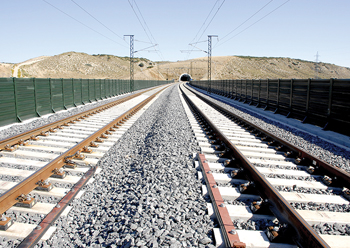
Railways have proven to be one of the fastest, most efficient, most comfortable and most sustainable means of transport.
On the right track for growth, success
AHMED SAYED, Middle East Business Development Director for Acciona Transports Solutions, discusses the importance of railways in promoting growth, energy efficiency and sustainability in the GCC as the region moves away from oil dependence.
01 June 2022
Throughout their long history, railways have proven to be one of the fastest and most efficient, comfortable and sustainable means of transport available. It is also the ground transportation with the lowest accident rate and an environmental impact that only exceeds the bike.
Development of a railway infrastructure promotes growth and sustainability. Cities that are integrated into a well-developed and well-maintained railway infrastructure stimulate their development through the fluid exchange of people, goods and businesses.
The UAE and Saudi Arabia account for a huge chunk of the $69 billion worth of rail projects under construction in the GCC.
Earlier this year, Saudi Arabia’s announcement that it would construct some 8,000 km of new railway lines – more than doubling its existing network – raised many eyebrows. It would be one of the most ambitious railway construction drives in the world in terms of size and scope, yet the challenges are equally formidable. In alignment with the kingdom’s overall growth, Saudi Arabia has reiterated its commitment to developing an additional 10,000 km of rail and metro by 2030. Besides boosting economic growth, a key factor in this commitment is the country’s ambition to lead the way in reducing transport emissions, relieving traffic congestion, improving residents’ health and quality of life, and progressively decarbonising rail transit as part of its roadmap to achieve net zero carbon by 2060.
Riyadh started its metro project in 2014, which will feature six metro lines and 85 stations and span a total of 176 km and which is expected to serve 3.6 million passengers per day once it is fully finished.
Another huge project is the Saudi Landbridge Project, with an estimated investment of $20 billion that involves construction of more than 1,000 km of new line between Jeddah and the Eastern Province and another 115-km track between Dammam and Jubail. The contracts will be signed within a year, and implemented withIn five to seven years.
Saudi Arabia’s $500-billion gigaproject, Neom, has commenced the procurement of different packages related to the high-speed rail scheme within The Line project. The 170-km linear city will have no cars or streets, with all residents living within a five-minute walk of essential facilities.
Such projects are helping the country move toward realising the goals of its Vision 2030, with transportation being a key driver of the economic renaissance that will take place as the kingdom’s economy moves away from its reliance on oil.
We also have the example of Dubai, where Dubai Municipality – before the creation of the Roads & Transport Authority (RTA) in 2005 – identified the need for a rail system to relieve the growing traffic levels. The city inaugurated its metro in September 2009, becoming the first urban metro network to run in the Gulf’s Arab states and fully operated by the RTA.
Using innovation in the Gulf’s transport sector will prove crucial in facing the challenges brought on by the population’s growing needs. Smart transportation is a very important in the region’s growth and development as is to learn about international best practices and benefit from the international expertise such as that offered by Acciona, which has more than 100 years of experience in the construction of railway infrastructure. The company has built more than 3,000 km of railways, 100 stations and facilities and 600 km of tunnels – which are serving more than 35.3 million travellers per year.
Last year, Acciona obtained the highest global qualification for sustainability in construction for the Dubai Metro’s Route 2020, making the new extension of the transit system the largest LEED Gold certified transport project in the world (see also UAE Focus, Page 60).


